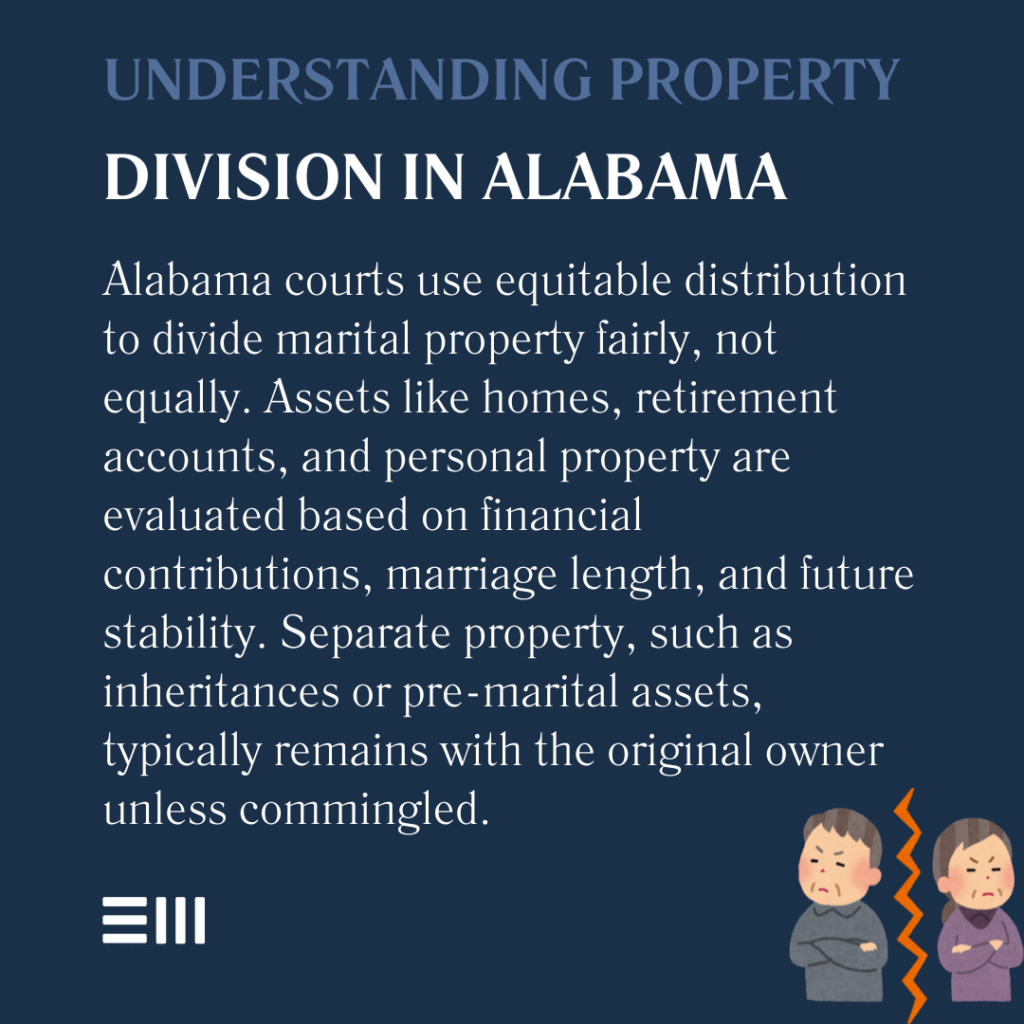
From family homes to retirement accounts, the division of property often becomes the cornerstone of divorce negotiations.
In Alabama courtrooms, couples face the complex task of unraveling years or decades of shared assets while building foundations for their separate futures.
Understanding Property Division in Alabama
Alabama follows specific principles when dividing marital property during divorce. These guidelines help courts achieve fair distributions while considering each family’s unique circumstances.
Key elements include:
- Marital Property: Assets acquired during marriage through either spouse’s efforts.
- Separate Property: Assets owned before marriage or received as individual gifts/inheritances.
- Equitable Distribution: Fair but not necessarily equal division of assets.
- Financial Contributions: Recognition of both monetary and non-monetary support.
- Length of Marriage: Impact of marriage duration on property division.
- Future Needs: Consideration of post-divorce financial stability.
- Business Interests: Treatment of family businesses and professional practices.
These principles guide property division decisions throughout the divorce process.

Types of Property in Divorce
Divorcing couples often discover that categorizing their property proves more complex than anticipated. Understanding different property types helps create realistic expectations.
Common property categories include:
- Real Estate: Primary homes, vacation properties, and investment properties.
- Financial Assets: Bank accounts, investments, and retirement funds.
- Personal Property: Vehicles, furniture, art, and collectibles.
- Business Assets: Company ownership, professional practices, and partnerships.
- Intellectual Property: Patents, copyrights, and trademarks.
- Employee Benefits: Stock options, bonuses, and pension plans.
- Joint Debts: Mortgages, loans, and credit card balances.
Proper classification of these assets supports fair division arrangements.
Common Questions About Property Division in Alabama
Understanding Alabama’s approach to property division helps parties prepare for negotiations and court proceedings.
These answers address frequently raised concerns about asset division.
How Does Alabama Determine “Equitable” Division?
Courts consider factors including marriage length, earning capacity, age, health, and contributions to marital assets when determining fair distribution.
What Happens to the Family Home?
Options include selling and dividing proceeds, buyout by one spouse, or continued co-ownership, depending on financial circumstances and agreements.
Are Retirement Accounts Always Divided?
Accounts earned during marriage typically qualify for division, requiring special court orders (QDROs) for proper distribution.
How Are Business Assets Handled?
Professional valuations help determine fair market value, with options including buyouts, share divisions, or continued partnership arrangements.
What About Inheritance or Gifts?
Separate property generally remains with the original owner unless commingled with marital assets or used for joint benefit.
How Do Debts Get Divided?
Courts consider which spouse incurred debts and their purpose when assigning responsibility for payment.
Can We Create Our Own Division Agreement?
Courts typically approve reasonable agreements reached through negotiation or mediation.
Asset Valuation Process
Accurate property valuation forms the foundation for fair division. Professional assessments help ensure the proper evaluation of complex assets.
Important valuation considerations include:
- Real Estate Appraisals: Professional assessments of property market values.
- Business Valuations: Expert analysis of company worth and growth potential.
- Investment Reviews: Current market values and future growth projections.
- Collectible Assessments: Professional opinions on unique item values.
- Retirement Analysis: Evaluation of pension and account present values.
- Debt Assessment: Current balances and payment responsibilities.
- Tax Implications: Impact of transfers and sales on final distributions.
These valuations support informed decision-making throughout negotiations.
Protecting Your Interests
Taking proactive steps helps ensure fair treatment during property division. Understanding your rights and options supports better outcomes.
Essential protection measures include:
- Document Gathering: Collecting financial records, asset information, and proof of ownership.
- Asset Inventory: Creating comprehensive lists of all property and possessions.
- Valuation Research: Obtaining professional opinions on complex assets.
- Account Monitoring: Tracking joint accounts and suspicious activities.
- Debt Review: Understanding all outstanding obligations and responsibilities.
- Legal Consultation: Seeking professional guidance on rights and options.
- Record Keeping: Maintaining detailed documentation of all agreements and discussions.
Careful attention to these details protects your interests throughout the process.
Complex Property Issues
Some divorce cases involve unique property challenges requiring special attention. Understanding these situations helps parties prepare for additional complexity.
Special considerations include:
- International Assets: Properties and accounts in multiple countries.
- Trust Interests: Rights to trust income or property.
- Family Business Succession: Planning for continued operation or sale.
- Hidden Assets: Addressing concerns about undisclosed property.
- Military Benefits: Division of service-related compensation and benefits.
- Intellectual Property Rights: Future income from patents or creative works.
- Tax Consequences: Impact on future financial obligations and benefits.
Proper handling of complex assets ensures comprehensive settlements.
Financial Planning During Division
Proper financial planning during property division helps ensure long-term stability. Understanding both immediate and future implications of division choices supports better decision-making.
Important financial elements include:
- Cash Flow Analysis: Evaluating income needs and sources post-divorce.
- Tax Planning: Understanding implications of property transfers and sales.
- Insurance Considerations: Addressing changes in health, life, and property coverage.
- Investment Strategy: Developing plans for divided retirement and investment accounts.
- Budget Development: Creating realistic post-divorce spending plans.
- Emergency Funds: Establishing separate financial safety nets.
- Credit Building: Planning for independent financial stability.
- Income Planning: Evaluating future earning potential and needs.
- Debt Management: Strategies for handling individual and joint obligations.
Thoughtful financial planning supports successful transitions after property division.

Documentation Requirements
Proper documentation plays a crucial role in property division cases. Understanding and organizing necessary paperwork helps streamline the division process.
Essential documents include:
- Financial Statements: Bank, investment, and retirement account records.
- Property Deeds: Real estate ownership documentation.
- Vehicle Titles: Proof of ownership for cars, boats, and other vehicles.
- Tax Returns: Previous years’ federal and state filings.
- Business Records: Ownership documents and financial statements.
- Insurance Policies: Life, health, and property coverage details.
- Debt Records: Mortgage, loan, and credit card statements.
- Asset Inventories: Detailed lists of personal property.
- Inheritance Records: Documentation of separately owned property.
Complete documentation supports efficient property division negotiations.
Post-Division Considerations
Successfully implementing property division agreements requires attention to various details. Understanding post-division responsibilities helps ensure smooth transitions.
Key considerations include:
- Property Transfer Timing: Scheduling and coordinating ownership changes.
- Account Separation: Process for dividing joint financial accounts.
- Name Changes: Updates needed on titles and documentation.
- Insurance Modifications: Adjusting coverage and beneficiary designations.
- Tax Filing Status: Changes in reporting requirements.
- Debt Separation: Process for removing names from joint obligations.
- Asset Protection: Securing separately owned property.
- Record Keeping: Maintaining documentation of completed transfers.
- Future Planning: Addressing potential modification needs.
Proper attention to these details supports the successful implementation of agreements.
Protect Your Financial Future Today
Take control of your property division process with experienced legal guidance.
Our attorneys understand Alabama’s property division laws and will work to protect your interests throughout your divorce.
Can't find what you're looking for? Search our site below.










